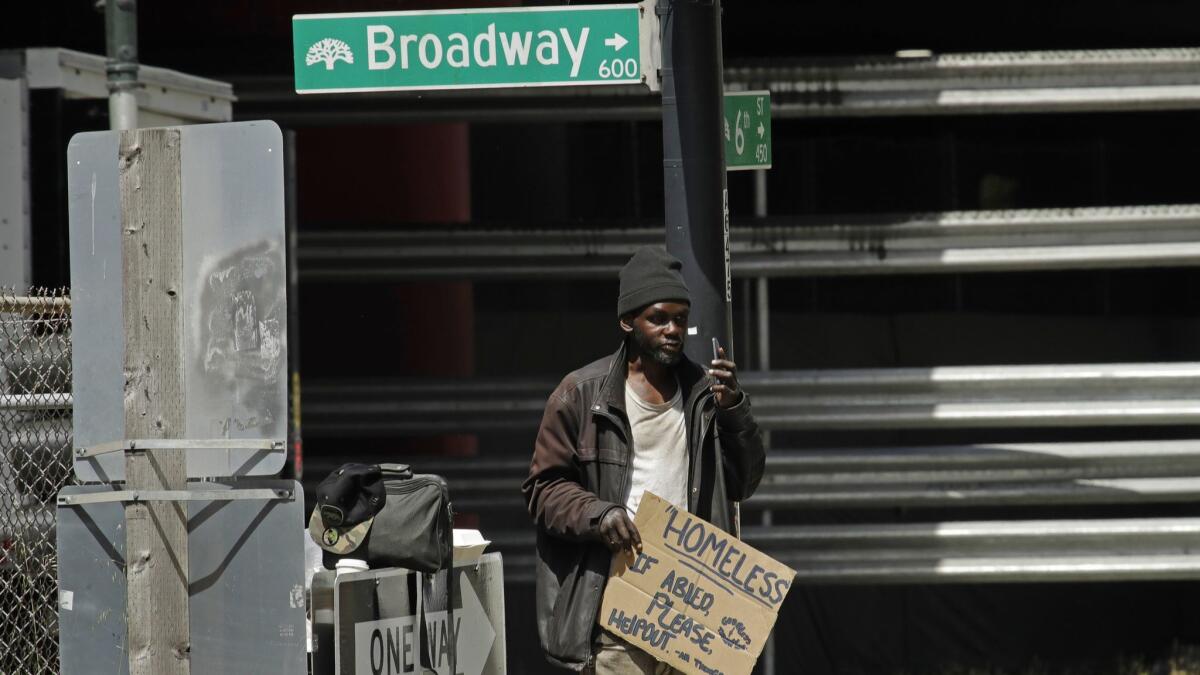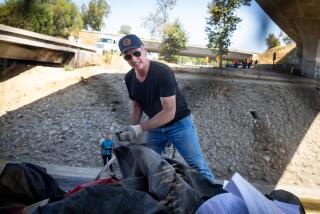Newsom taps task force leaders to address California’s rising homeless population

Reporting from Oakland — Calling homelessness in California an escalating human crisis, Gov. Gavin Newsom on Tuesday announced the leaders of a task force formed to implement programs aimed at getting people off the streets.
Newsom made the announcement after touring Oakland’s Henry Robinson Multiservice Center, a century-old hotel converted into a 137-bed facility that houses more than 300 homeless people a year.
Roughly 80% of the people who enter the center, after receiving months of mental health counseling, job training and other essential care, move into permanent housing, according to Oakland Mayor Libby Schaaf.
“Homelessness is our No. 1 challenge,” Schaaf said. “We can never accept our elders sleeping outside or our families sleeping in cars.”
Gov. Gavin Newsom wants to double spending on homelessness — to $1 billion »
Newsom first announced a homelessness task force during his State of the State address in February, naming Sacramento Mayor Darrell Steinberg as its leader. On Tuesday, the governor added Los Angeles County Supervisor Mark Ridley-Thomas as co-chairman.
The task force will identify programs such as the Henry Robinson Multiservice Center and propose ways to replicate them statewide, Newsom said.
The governor said he’s not interested in simply releasing a “white paper” on homelessness.
“The state of California has never had a homeless plan. The state of California has been nowhere to be found on the issue of homelessness,” Newsom said. “I know what the problem is. None of us need a report telling us what the problem is.”
While the state’s homeless population declined slightly last year from 134,000 to just under 130,000, according to data reported to the U.S. Department of Housing and Urban Development, that number could increase this year.
Earlier this month, San Francisco reported a 17% increase in homeless residents over the last two years to 8,011. Alameda, Santa Clara, Kern, Orange, San Bernardino and Riverside counties all recently saw double-digit percentage increases in their homeless populations, with the number in Alameda up 43% to 8,022 since 2017.
Los Angeles will release numbers from its homeless population count on May 31, and officials are expecting the number to rise even though the region spent $619 million last year on the problem.
Peter Lynn, executive director of the Los Angeles Homeless Services Authority, told the L.A. County Board of Supervisors recently that the increasing homeless population was due to rising rents and a lack of available low-income housing pushing more people onto the streets than the region could find homes for.
Newsom included $1 billion in his proposed budget to combat homelessness — the plan faces a mid-June deadline for passage. Of that amount, $650 million in grants would go to local governments and regional homelessness agencies for emergency shelters, rental assistance and the construction of permanent housing, among other uses. The money is on top of $2 billion in state funding for homeless housing developments that voters approved in November.
Before Tuesday’s news conference, Newsom spoke with Tekal Carlisle, 42, who lived on the streets of Oakland for years before she came to the Henry Robinson Multiservice Center. Carlisle said the program, which houses people for up to six months, allowed her to rebuild her life and look for work without having to lug her possessions with her.
She said addressing homelessness is an enormous challenge because people living on the streets and sleeping in their cars come from all walks of life and are dealing with a wide spectrum of issues, including mental illness and drug addiction.
“The only thing we do have in common is homelessness,” Carlisle said.
The task force, whose remaining members will be announced in the coming weeks, will meet across the state and provide Newsom with at least one annual report highlighting successful homelessness prevention strategies. The report will guide the creation of regional plans to combat homelessness, the governor’s office said.
Newsom also announced Tuesday that psychiatrist and neuroscientist Dr. Tom Insel would advise him on strategies to address mental health issues. Insel, whom Newsom referred to as the state’s “mental health czar,” served as director of the National Institute of Mental Health for 13 years until 2015.
More to Read
Get the L.A. Times Politics newsletter
Deeply reported insights into legislation, politics and policy from Sacramento, Washington and beyond. In your inbox three times per week.
You may occasionally receive promotional content from the Los Angeles Times.












